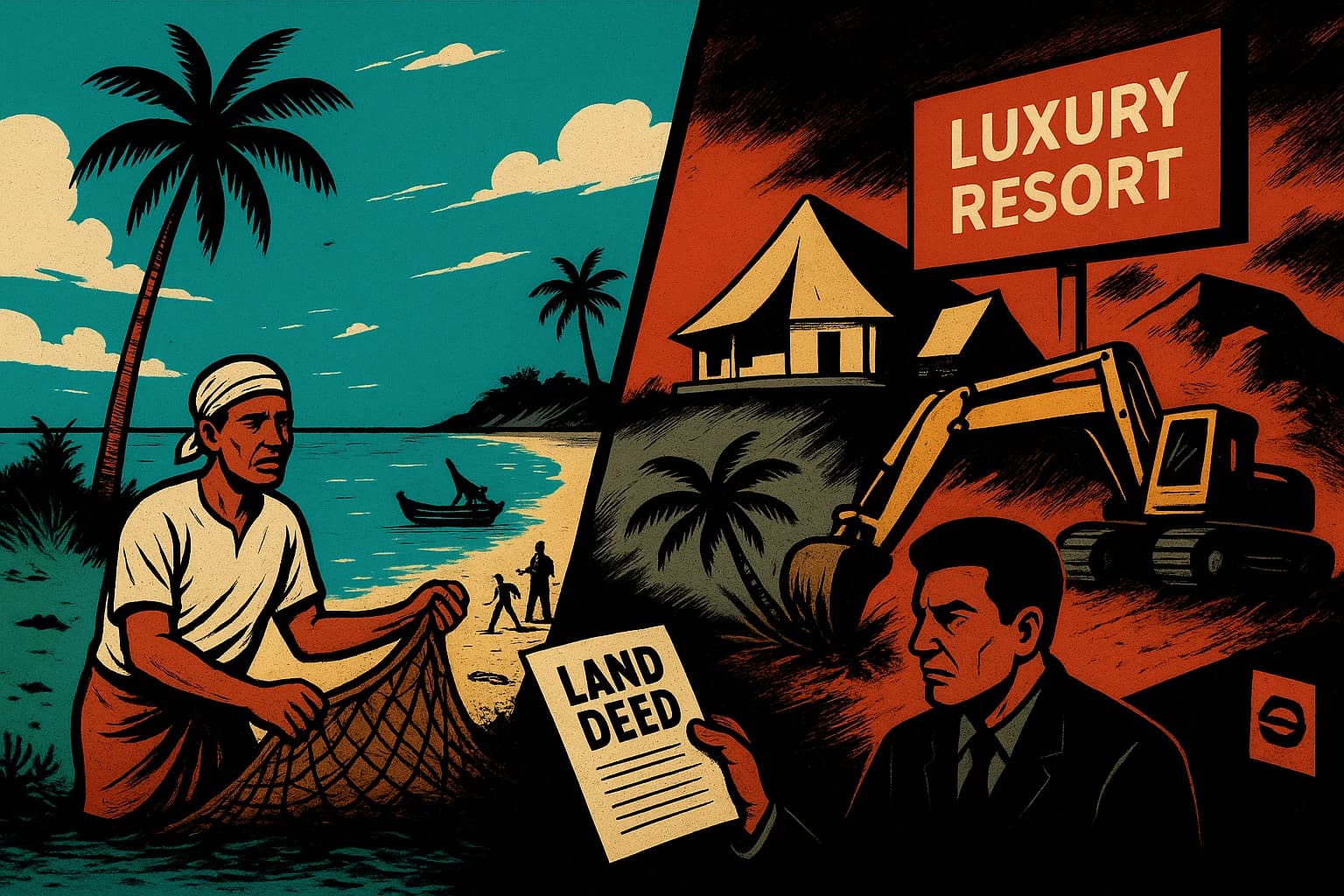Corporate Gentrification of Lakshadweep Islands
by Arjun S Anil
5 min read • September 02, 2025

Corporate greed has invaded the pristine shores of the Lakshadweep archipelago, orchestrating what amounts to systematic ethnic cleansing disguised as development. This remote Union Territory, home to a small but vibrant indigenous population, is being ruthlessly transformed through state-sponsored luxury tourism that serves wealthy outsiders while devastating local communities.
For generations, Lakshadweep's residents have sustained themselves through Pandaram coastal lands used for agriculture, fishing, and habitation. While land disputes between islanders and the administration have simmered for years, the situation has deteriorated dramatically since 2014, reaching crisis levels after 2020 with the appointment of a new administrator. This marks a dangerous precedent: the first administrator from outside the civil service tradition, signaling a shift from governance to corporate colonialism.
This Union Territory operates under direct central control without its own legislative assembly, leaving its 96% Muslim population particularly vulnerable to authoritarian overreach. Under the current ruling party's policies, residents find themselves stripped of democratic agency, unable to resist the systematic dismantling of their way of life.
Cultural Warfare Through Regulation
The assault on islanders' identity comes wrapped in bureaucratic language but reveals itself as deliberate cultural erasure. Proposed regulations including a development authority framework, animal preservation rules that ban beef consumption, anti-social activities legislation, and rigged local election procedures expose the cynical gap between centralized Hindu nationalist policies and the reality of Muslim island life.
The beef ban, coupled with the elimination of beef from school meal programs and the removal of Islamic holidays from academic calendars, represents nothing less than cultural imperialism. These measures systematically attack the religious and dietary practices that have sustained the 96% Muslim population for centuries, forcing them to conform to majoritarian Hindu values or face persecution.
Legalized Land Theft
The proposed development authority would wield dictatorial powers to seize land, evict families, and redistribute property to corporate interests, all while bypassing any requirement for local consent. The targeted lands include ancestral properties held through traditional inheritance systems for generations. This constitutes not just theft, but the destruction of cultural heritage and community bonds that have defined island society.
Although the development authority regulations await formal enactment, the administration has already begun surveying and marking trees for removal, creating a climate of fear among residents desperately gathering documents to prove ownership of their ancestral homes. This bureaucratic intimidation serves to soften resistance before the final assault on their rights.
Tourism as Colonialism
Since June 2022, the administration has aggressively pushed forward with luxury tent city construction across Agatti, Bangaram, and Thinnakkara islands. The five-year contract awarded to Praveg Ltd represents the privatization of public resources for elite consumption, complete with extension possibilities that could entrench corporate control indefinitely.
Eviction notices have been systematically distributed to fishing families, demanding they clear coastal areas of so-called "encroachments." These "encroachments" are actually traditional fishing infrastructure that communities have used for generations to dry fish and store boats. The deliberate mislabeling of legitimate community assets as illegal occupation reveals the administration's contempt for indigenous practices.
Most egregiously, family lands where fishing communities have lived and worked for generations are being arbitrarily reclassified as "accreted land" and seized without due process, compensation, or alternative housing. This represents state-sanctioned theft on a massive scale, violating every principle of property rights and human dignity.
While luxury tents will extract Rs.20,000 per night from wealthy tourists, the very people whose labor and culture created this paradise face homelessness and destitution. Additional islands including Kavaratty, Minicoy, Kadamat, Suheli, and Bangaram have been marked for similar exploitation, designated as exclusive playgrounds for the ultra-wealthy. These projects threaten to displace thousands of indigenous residents, destroying not just individual livelihoods but entire community structures built over centuries.
Environmental Destruction in Paradise
The environmental hypocrisy is staggering. While promoting Lakshadweep as an eco-tourism destination, these developments guarantee ecological catastrophe for one of India's most fragile marine ecosystems. The inevitable pollution, disruption of coral reef systems, and interference with fish breeding cycles will destroy the very natural beauty being commodified for profit.
The administration shows callous disregard for the delicate balance that local communities have maintained with their environment for generations. Their sustainable practices are being replaced by extractive tourism that will leave behind environmental devastation long after the profits have been extracted.
Resistance Against State Violence
Local communities have filed numerous cases challenging this systematic oppression, with most currently under litigation in Kerala High Court. However, the legal system moves slowly while the administration accelerates its assault on indigenous rights.
Perhaps most telling is the near-complete media blackout surrounding this crisis. Despite the severity of what amounts to ethnic cleansing, mainstream media outlets have largely ignored the plight of Lakshadweep's people. This silence enables the administration to operate without accountability, implementing policies that would generate outrage if applied to more politically connected populations.
Across Lakshadweep, including areas facing defense land acquisition, communities continue organizing and seeking legal protection. Their struggle represents more than a local land dispute. It embodies the broader conflict between predatory capitalism and indigenous rights, between corporate colonialism and community sovereignty.
The Lakshadweep crisis exposes the true nature of the current development model: a system that enriches corporations and political elites while destroying the communities whose heritage and labor created the value being extracted. Without immediate intervention, this paradise will become yet another example of how neoliberal policies facilitate the transfer of wealth from the powerless to the powerful, wrapped in the language of progress and development.
About the Author
Arjun S Anil is a mechanical engineering graduate. He has previously been a resource person for an atheist and free-thinker's community, conducting research on social issues and scientific temper and curating presentations for their seminars.